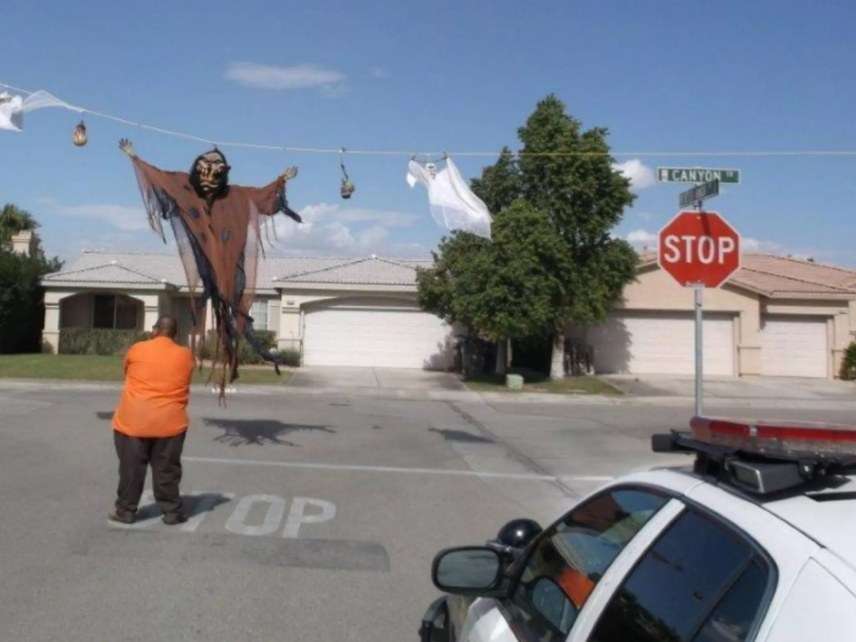Minor Violations Lead to Massive Prosecution Fees in Two California Desert Towns
A couple of busted windows can result in a bill for thousands-even tens of thousands-of dollars.

A couple of cities in the California desert have found a novel and remarkably cruel way to make money—force citizens to pay for the privilege of being prosecuted by the attorneys contracting with these cities.
We've seen cities across the country abuse their own citizens—particularly its poorest residents and visitors—with vicious enforcement of petty laws designed to create a revenue stream via a cascade of fines and fees.
But I don't think we've seen an enforcement mechanism as nasty and cruel as the one the Desert Sun has uncovered out in California's Inland Empire. The cities of Indio and Coachella partnered up with a private law firm, Silver & Wright, to prosecute citizens in criminal court for violations of city ordinances that call for nothing more than small fines—things like having a mess in your yard or selling food without a business license.
Those cited for these violations fix the problems and pay the fines, a typical code enforcement story. The kicker comes a few weeks or months later when citizens get a bill in the mail for thousands of dollars from the law firm that prosecuted them. They are forcing citizens to pay for the private lawyers used to take them to court in the first place. So a fine for a couple of hundred dollars suddenly becomes a bill for $3,000 or $20,000 or even more.
In Coachella, a man was fined $900 for expanding his living room without getting a permit. He paid his fine. Then more than a year later he got a bill in the mail from Silver & Wright for $26,000. They told him that he had to pay the cost of prosecuting him, and if he didn't, they could put a lien on his house and the city could sell it against his will. When he appealed the bill they charged him even more for the cost of defending against the appeal. The bill went from $26,000 to $31,000.
Brett Kelman of the Desert Sun found 18 cases in Indio and Coachella where people received inordinately high legal bills for small-time violations. A woman fined for hanging Halloween decorations across a city street received legal bill for $2,700. When she challenged it, the bill jumped to $4,200.
Kelman notes that these thousands of dollars in fees came from a single court hearing that lasted minutes.
Silver & Wright representatives declined to talk to the Desert Sun. One of them even claimed attorney/client privilege even though they're serving as prosecutors on behalf of city governments. But the law firm's web site makes it very clear that what happened is not a mistake. It's a law firm focused on helping cities go after private properties for "nuisance abatement" and code enforcement. Among its services is "ordinance drafting." That they offer such services matters because, according to the Desert Sun, the two cities contracted with the law firm first, and then they crafted brand new nuisance ordinances to facilitate Silver & Wright recouping the fees by billing citizens for their own prosecutions without having to go through a judge.
"Cost recovery" is another emphasis of Silver & Wright's services. Here's a direct quote from their site: "Our attorneys have developed unique and cutting edge practices to achieve success for our clients and make nuisance abatement and code enforcement cost neutral or even revenue producing." [emphasis added]
They're openly bragging about using prosecutions as a way to help cities make money.
And then there's this buried deep in the story: Matthew Silver, one of the firm's partners, is also a vice president for the California Association of Code Enforcement Officers. He runs a private law firm but also leads a professional association for government employees responsible for enforcing the laws that lead to his firm's billable hours (or minutes, it seems).
In response the Desert Sun's investigations, it appears that Coachella officials will rethink their methods. Indio's interim city manager and a council member, however, defended the harsh enforcement, insisting this "aggressive approach" was getting results. This aggressive approach apparently includes an $18,600 bill for having overgrown grass, two broken windows, and a "sun-damaged address number."
Read more from the Desert Sun here.


Show Comments (68)